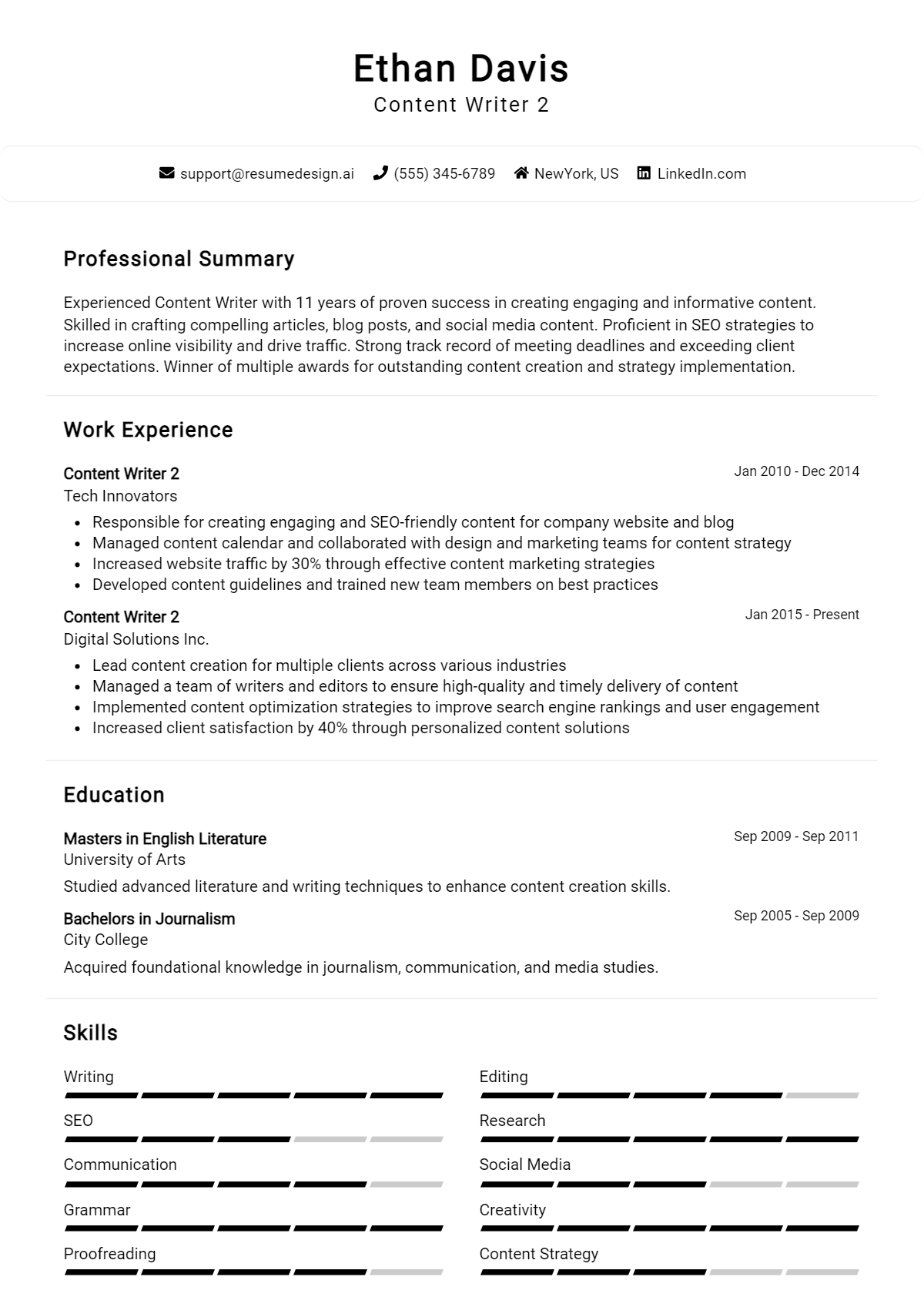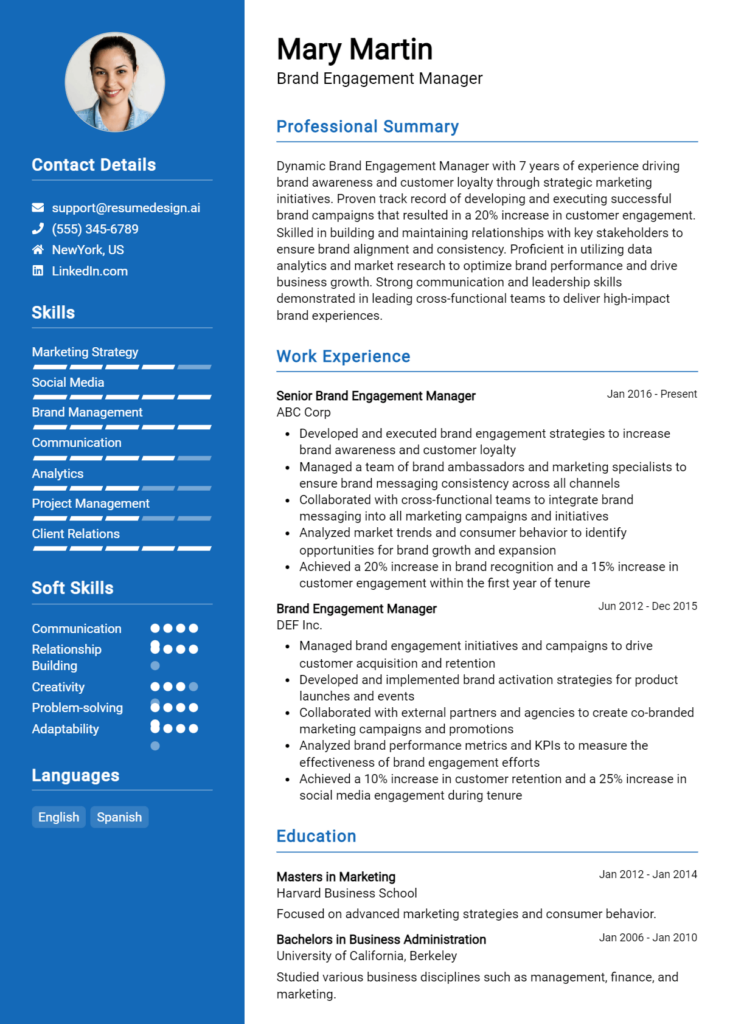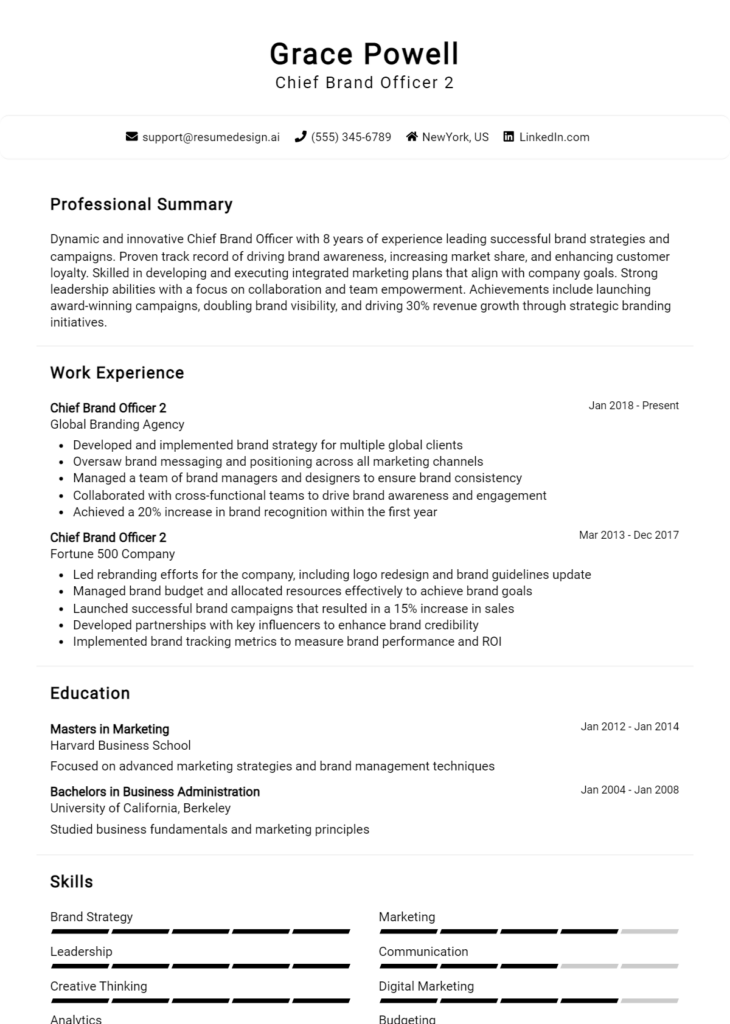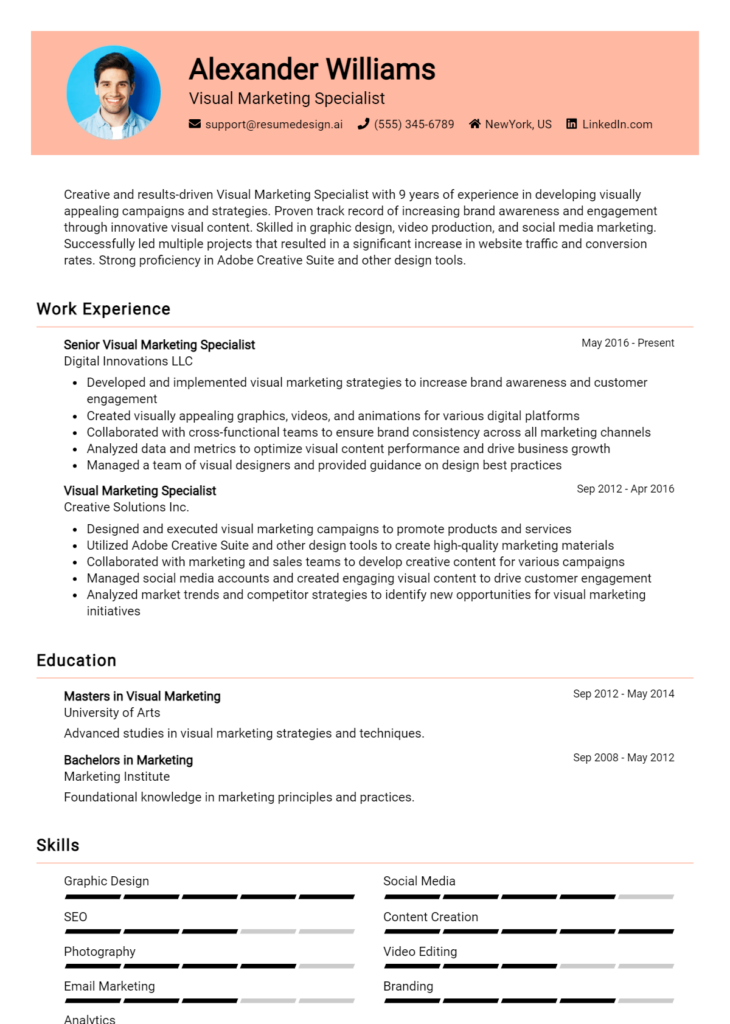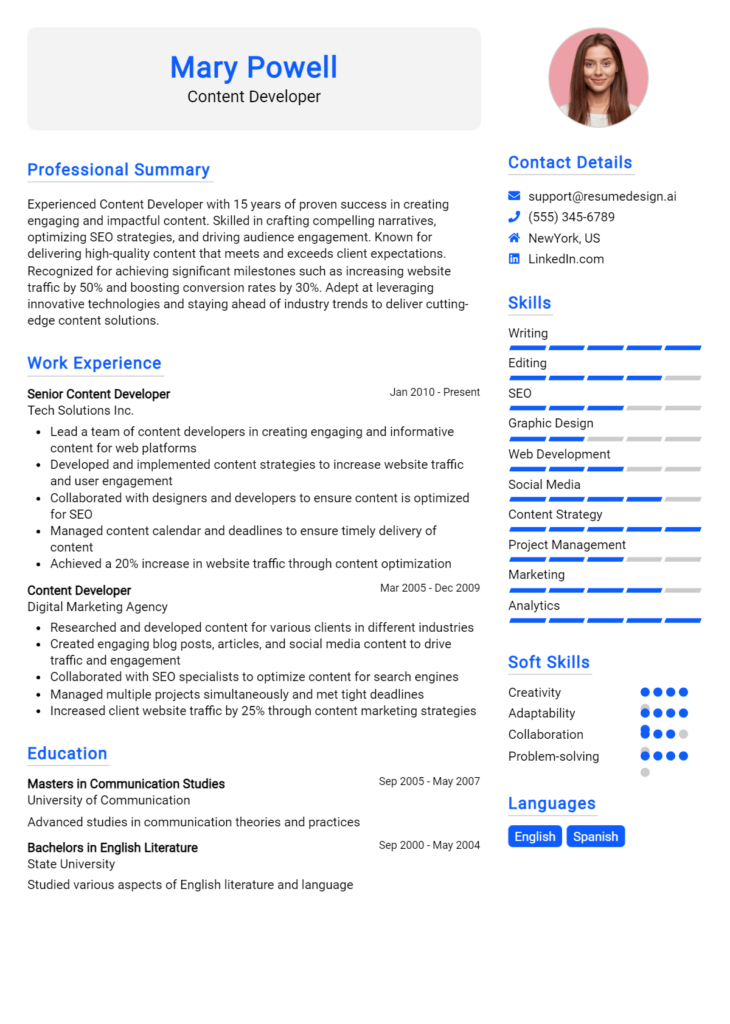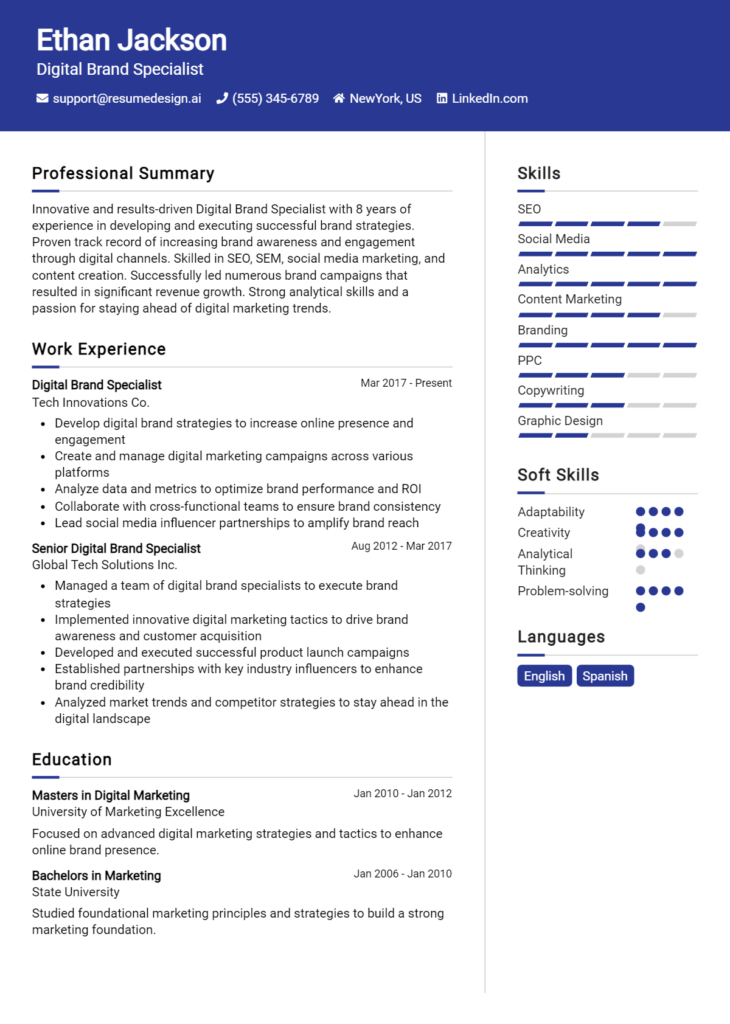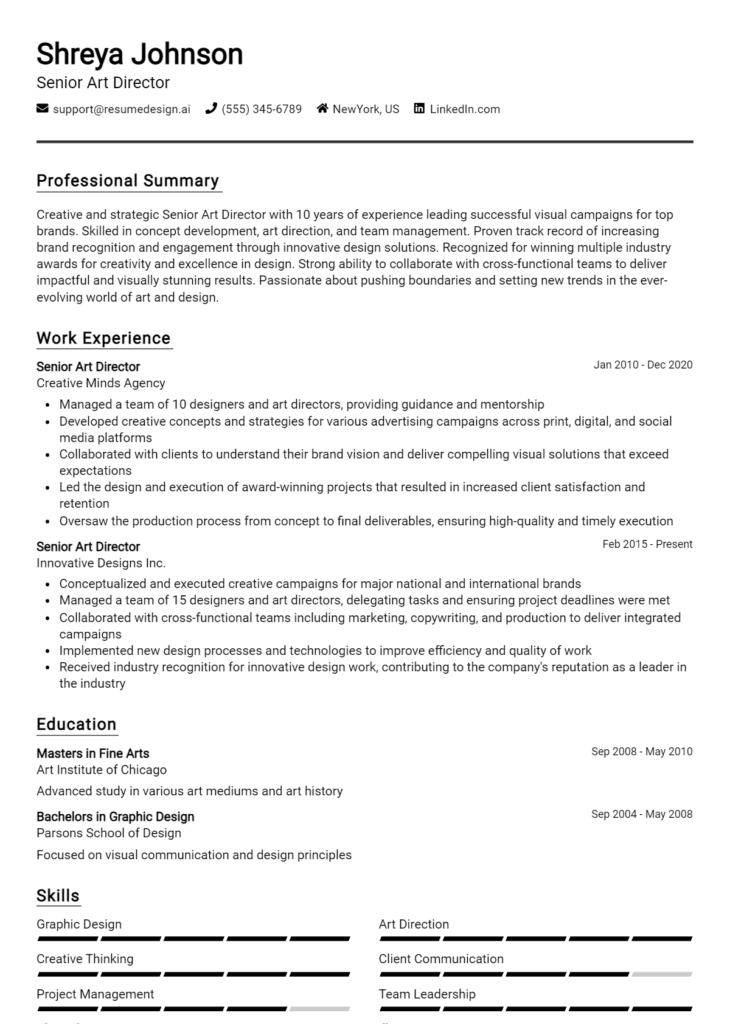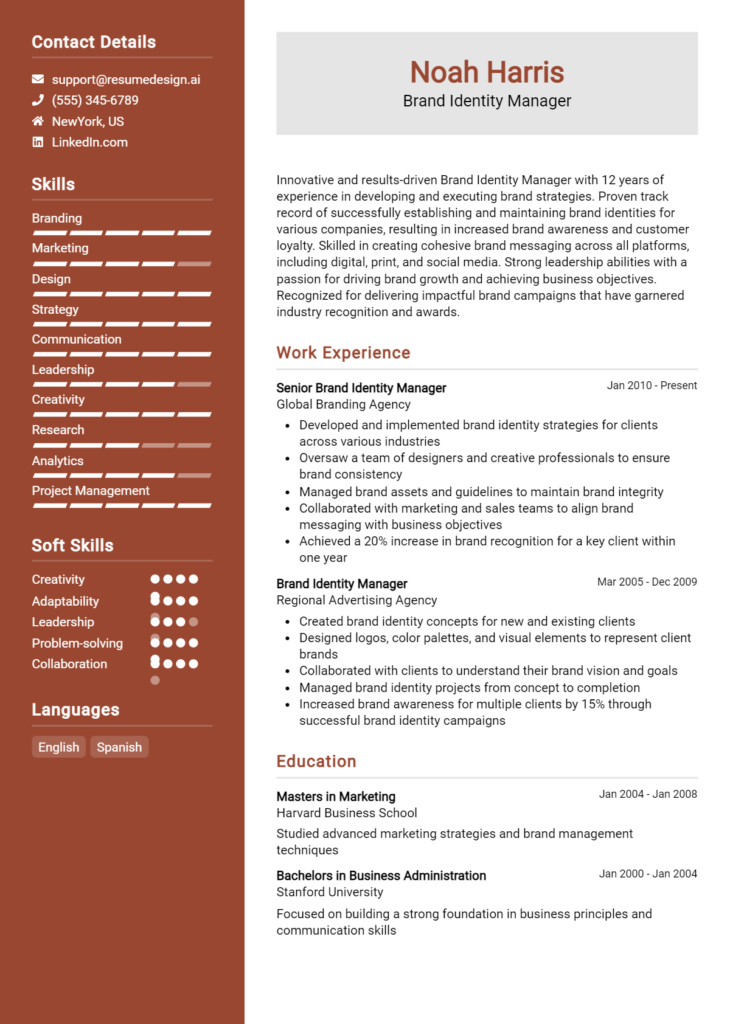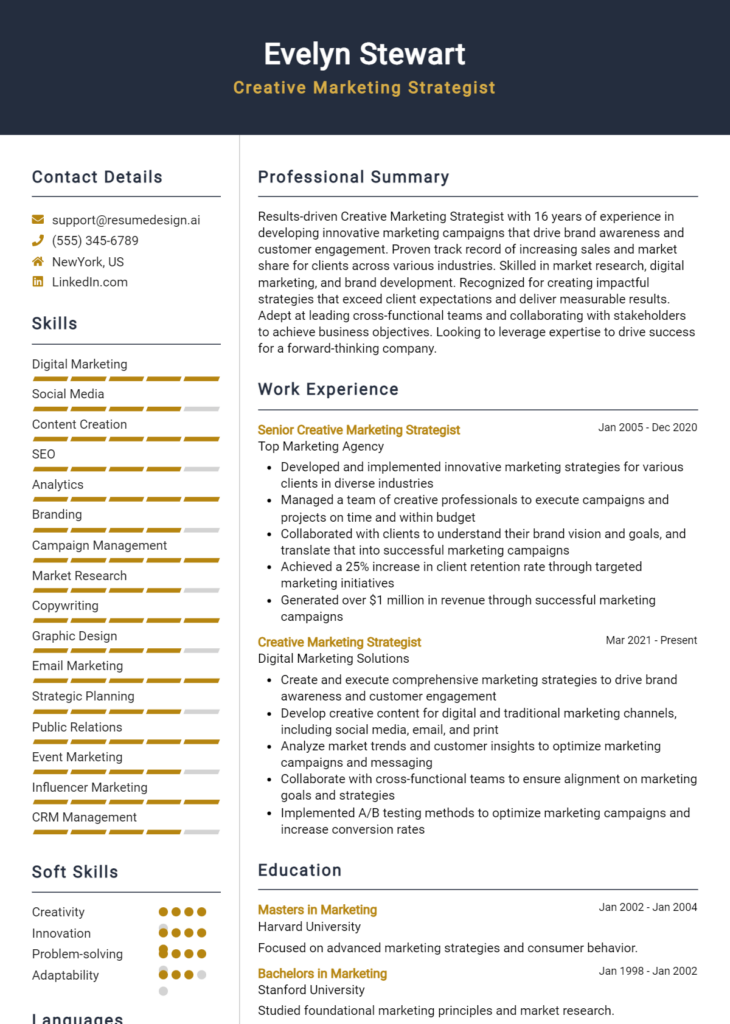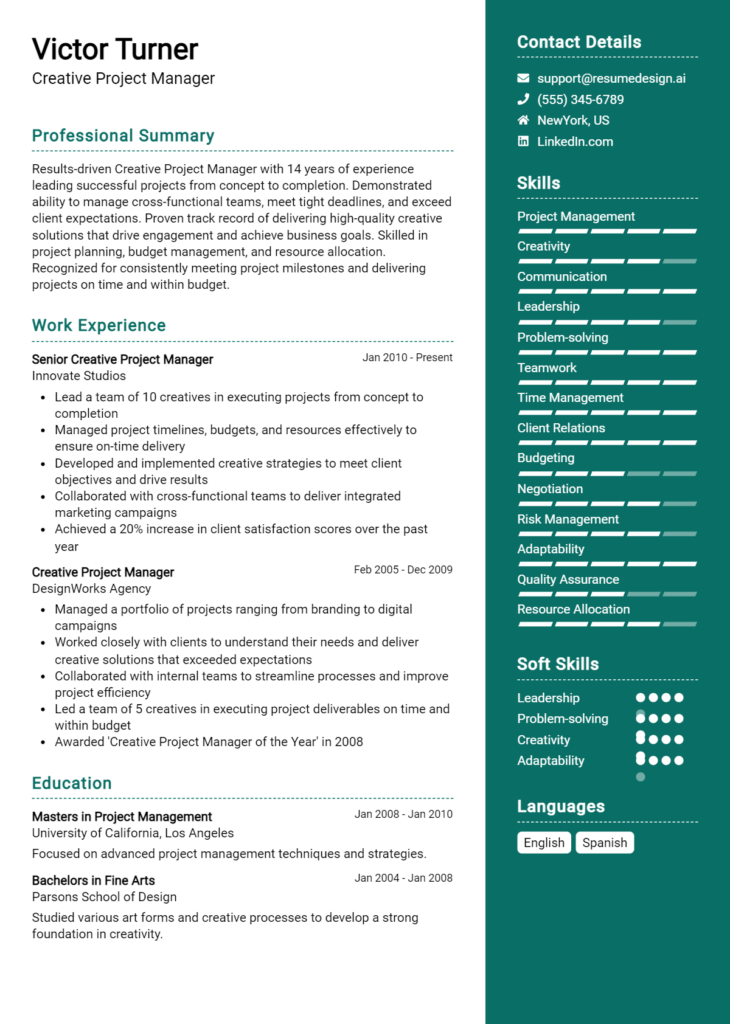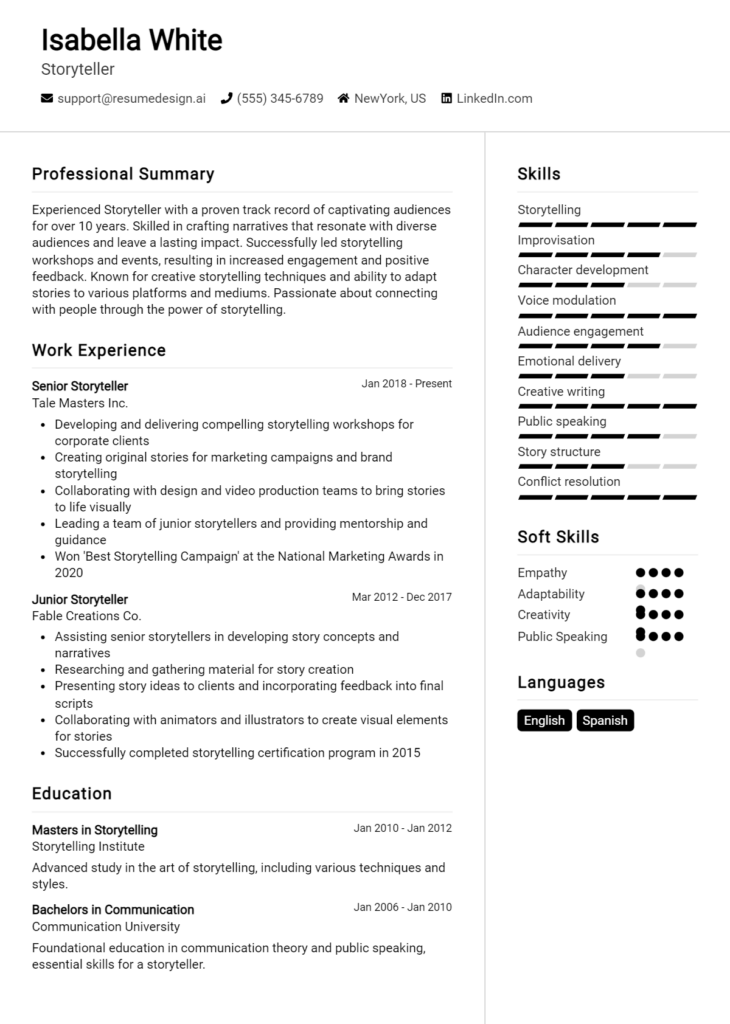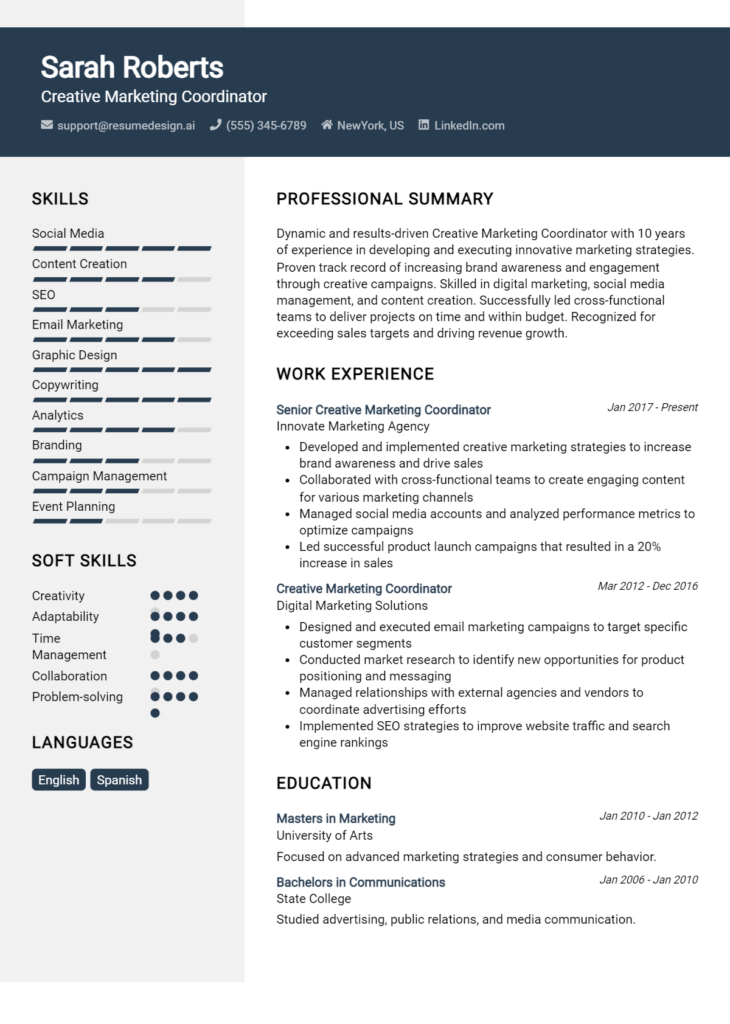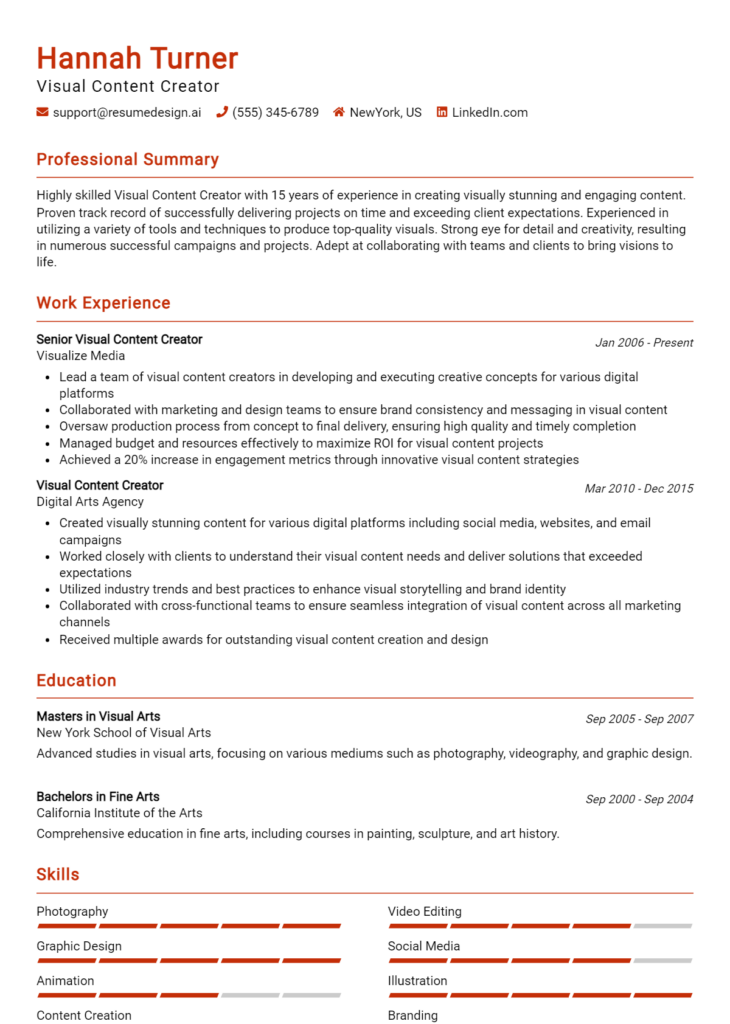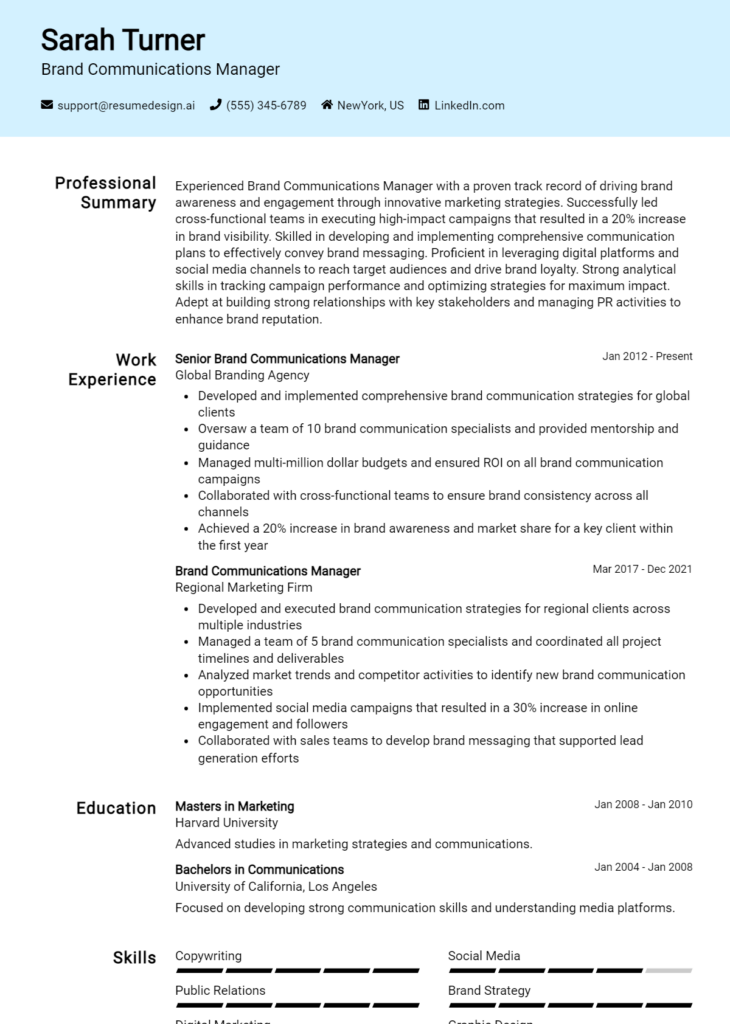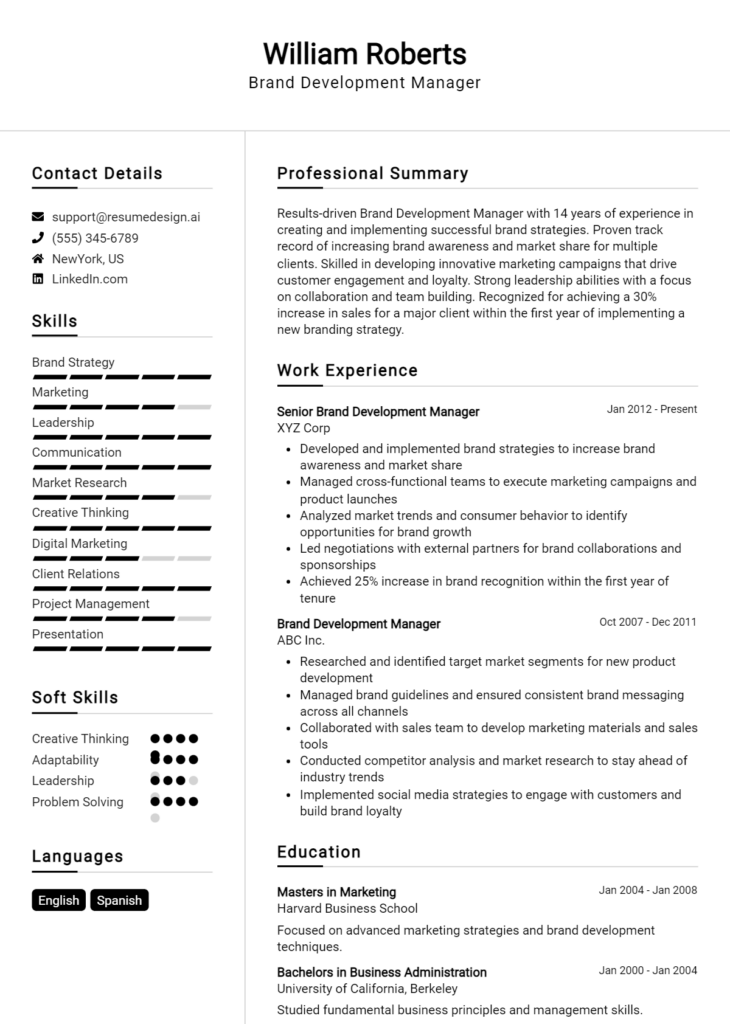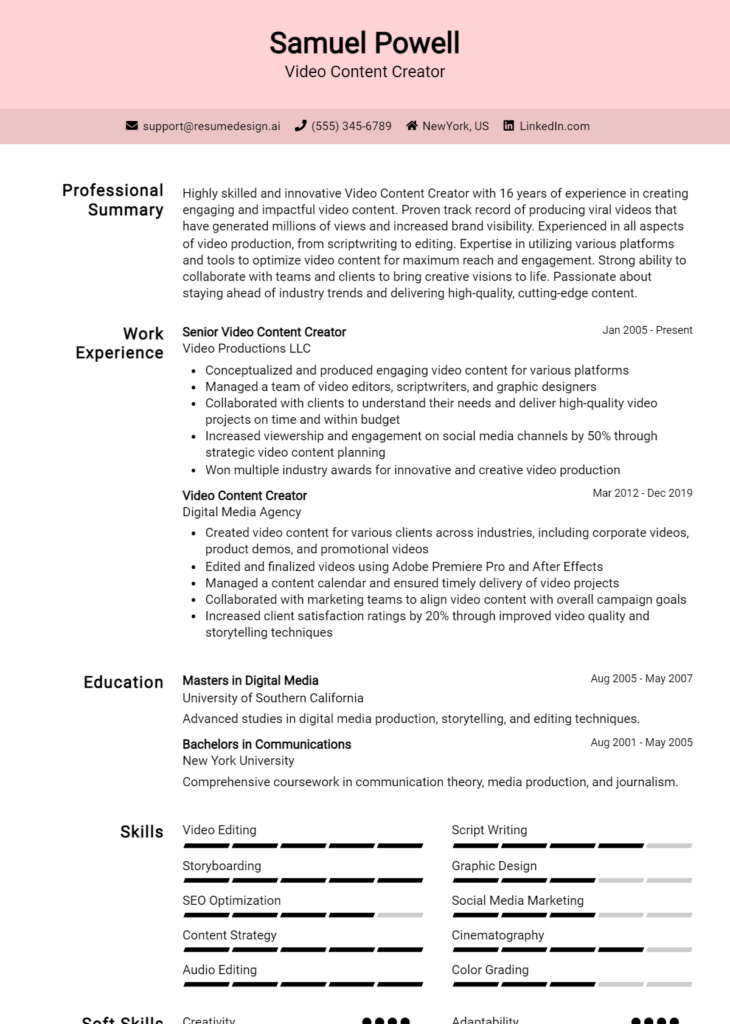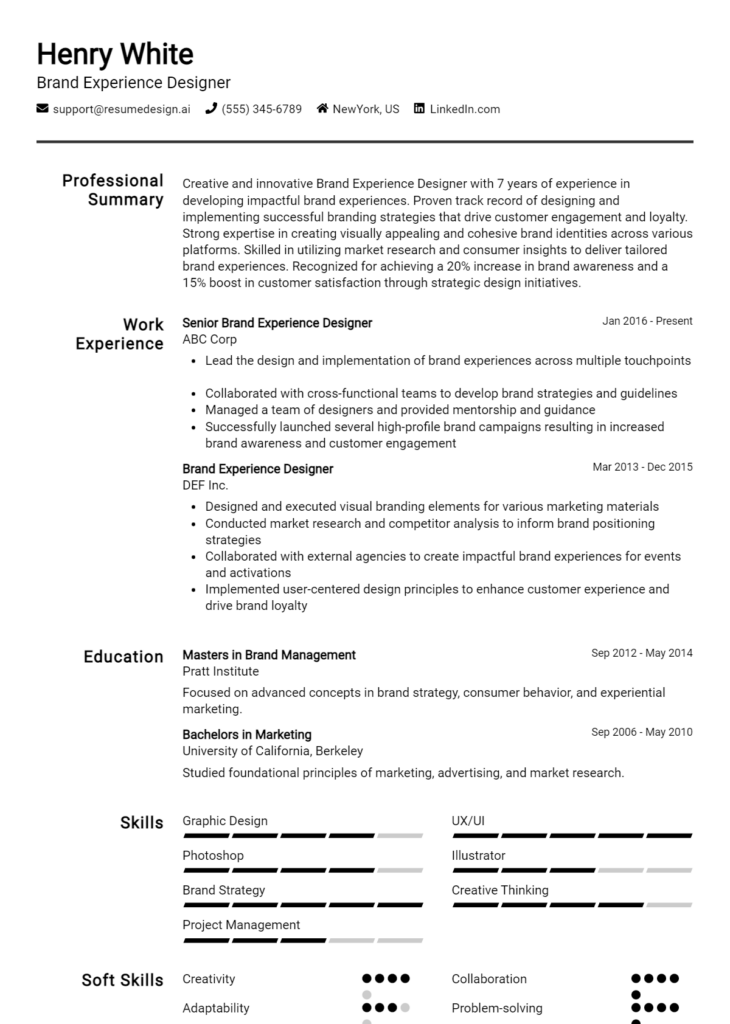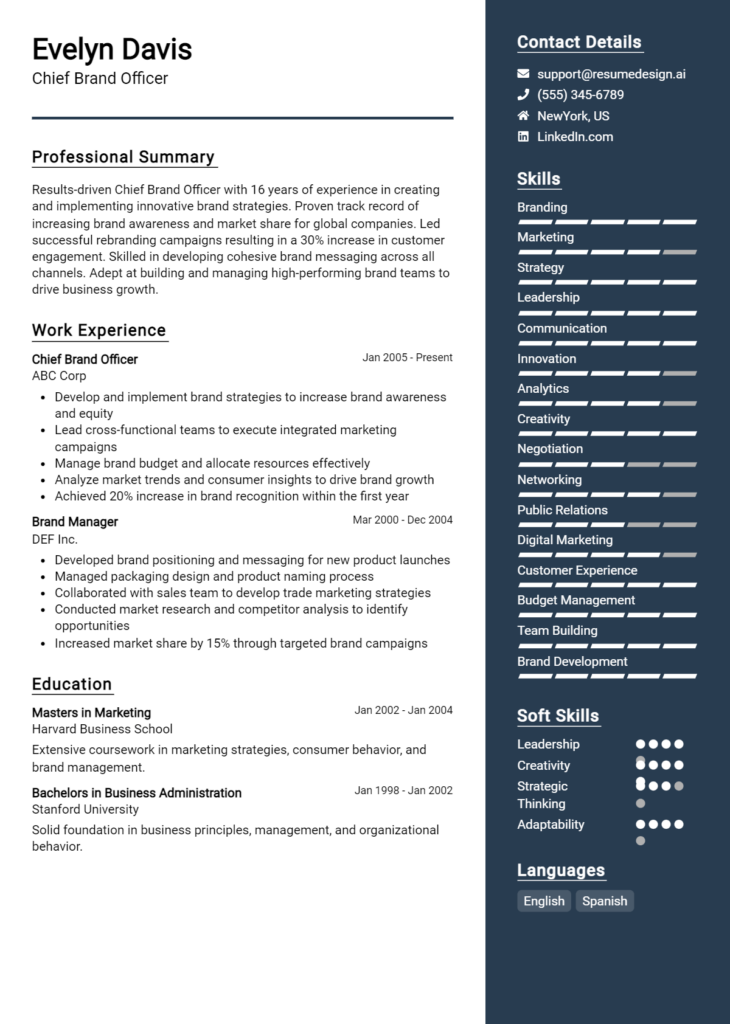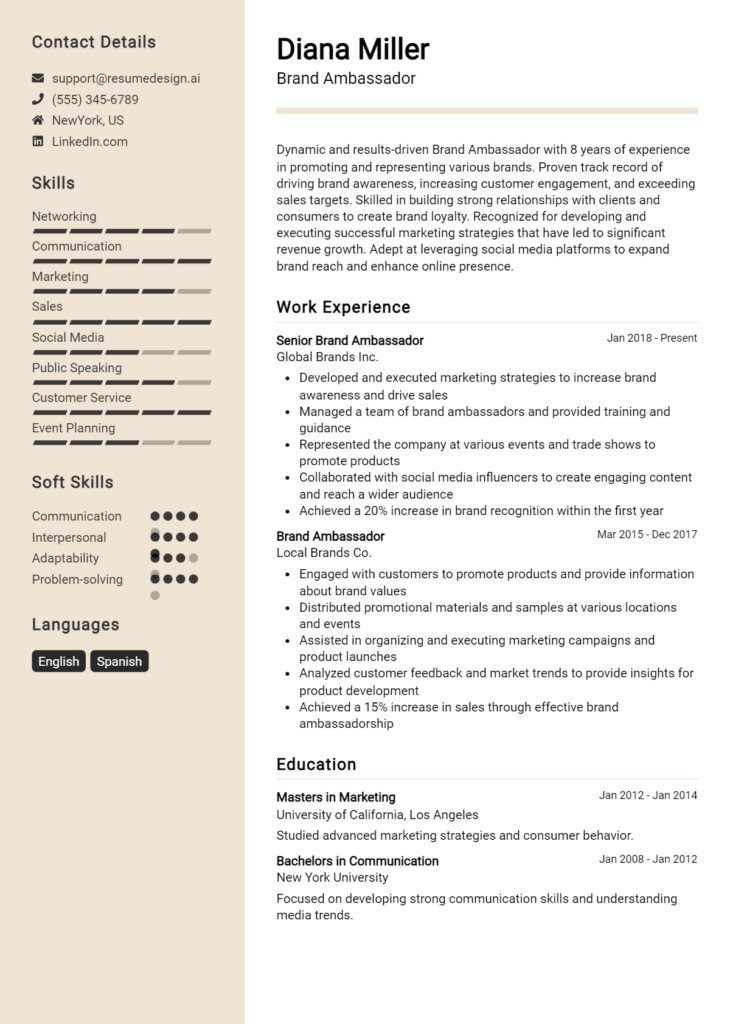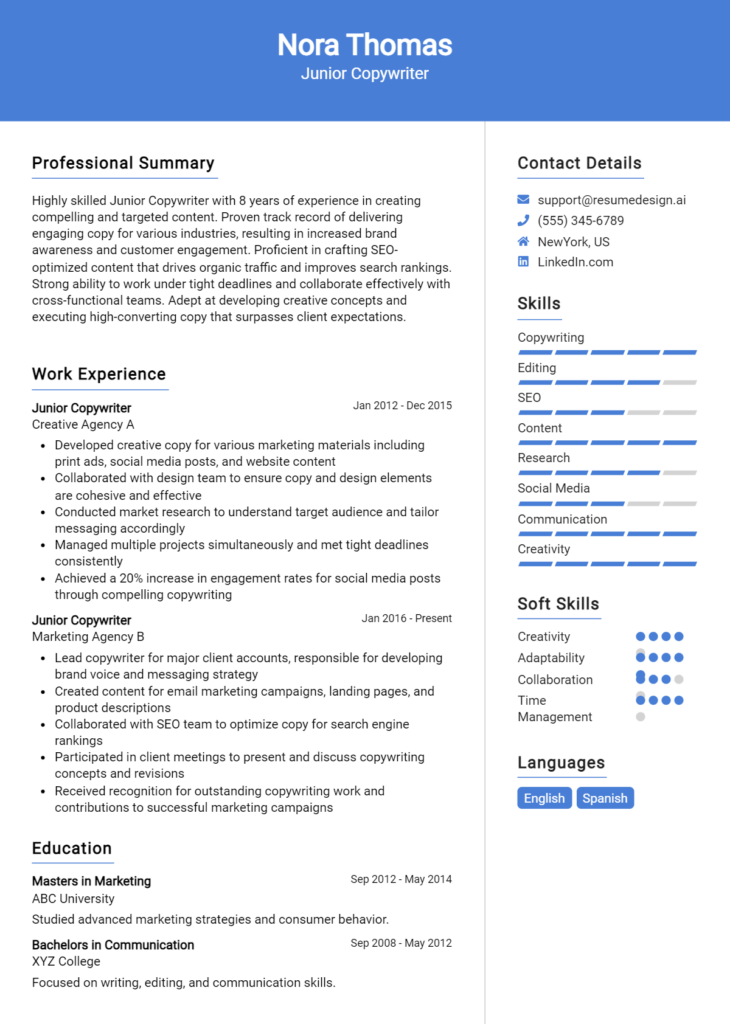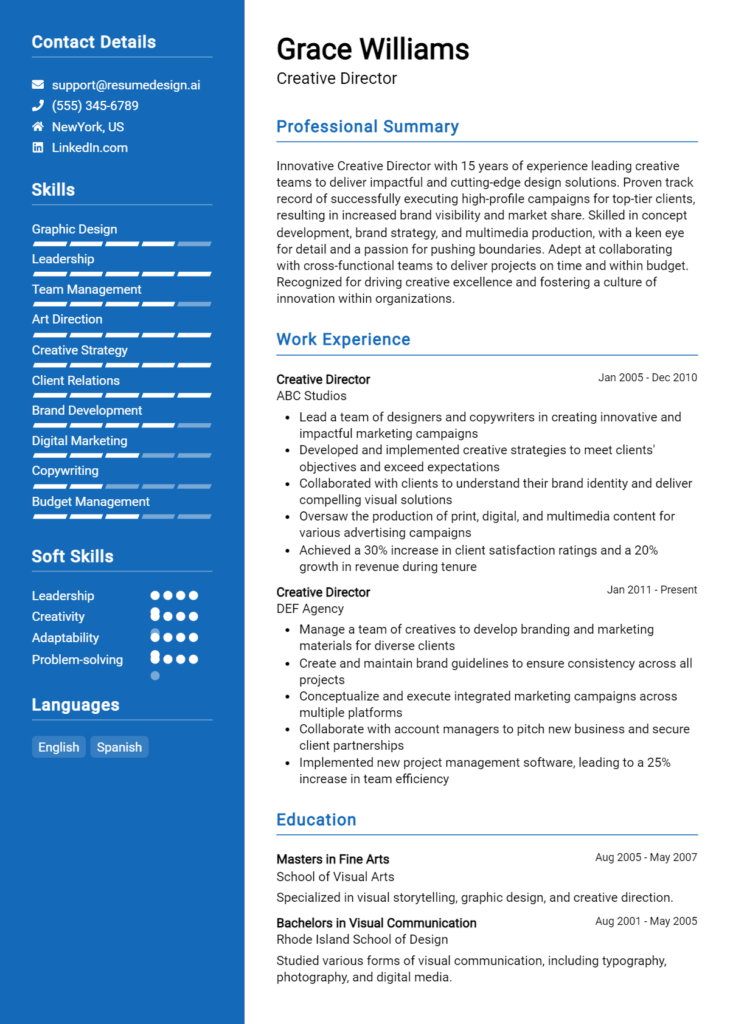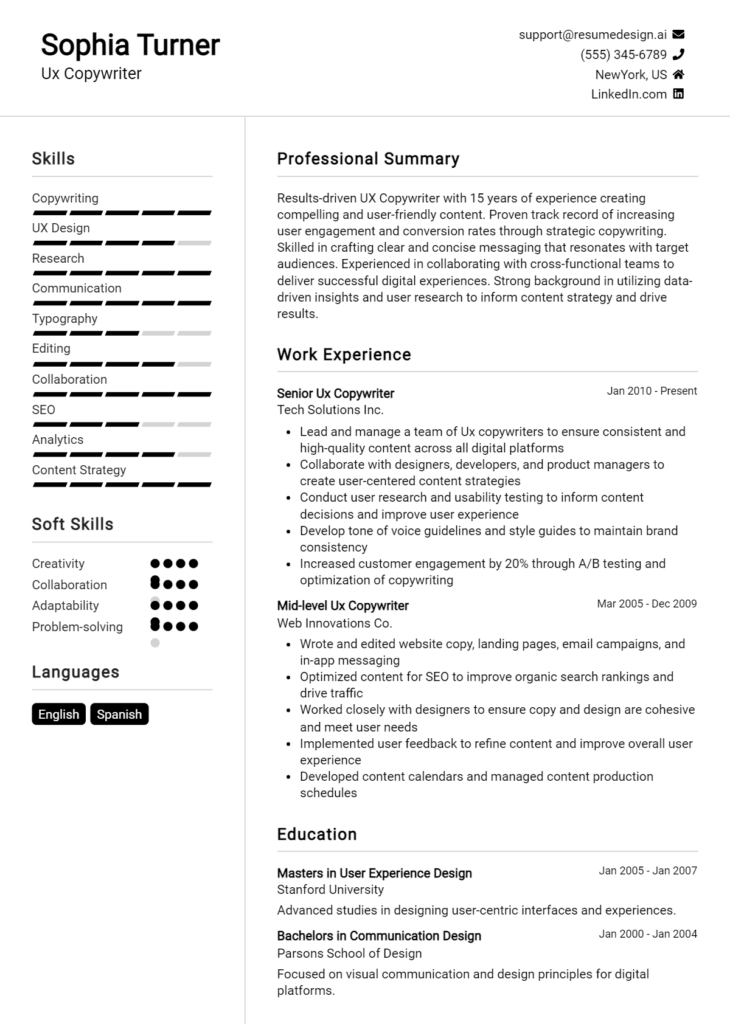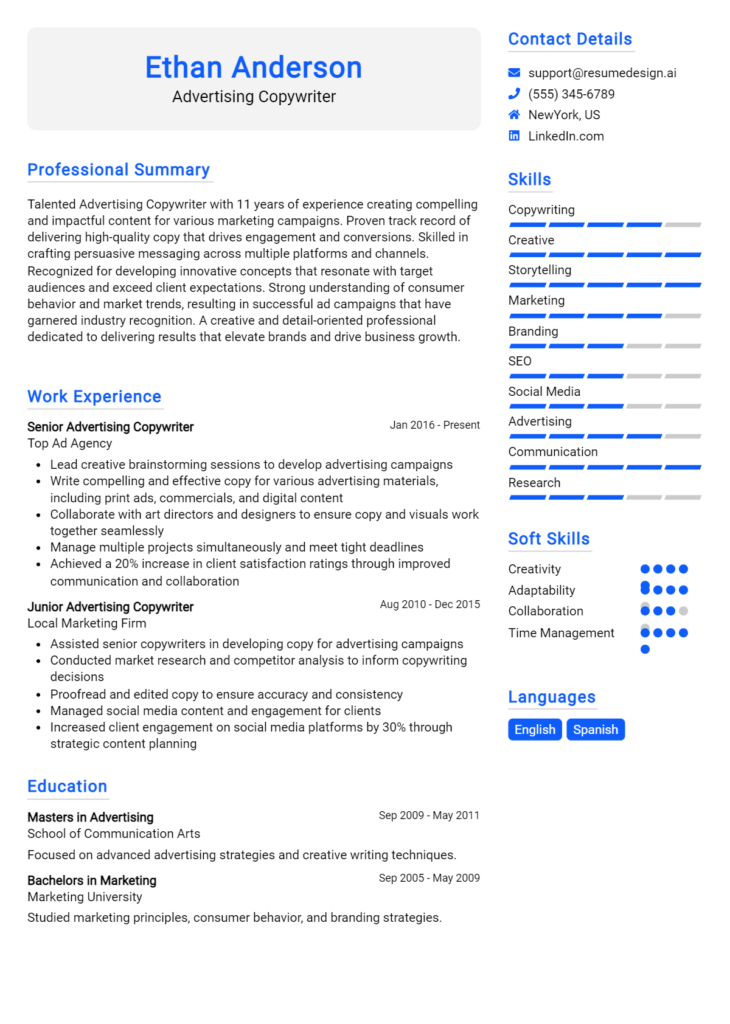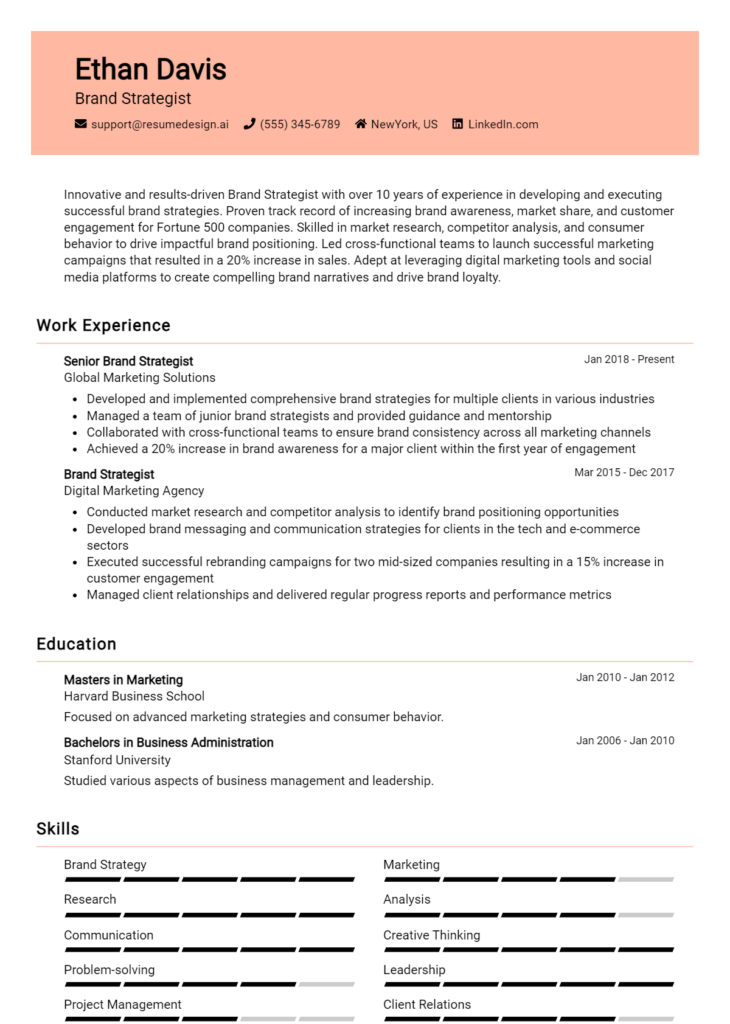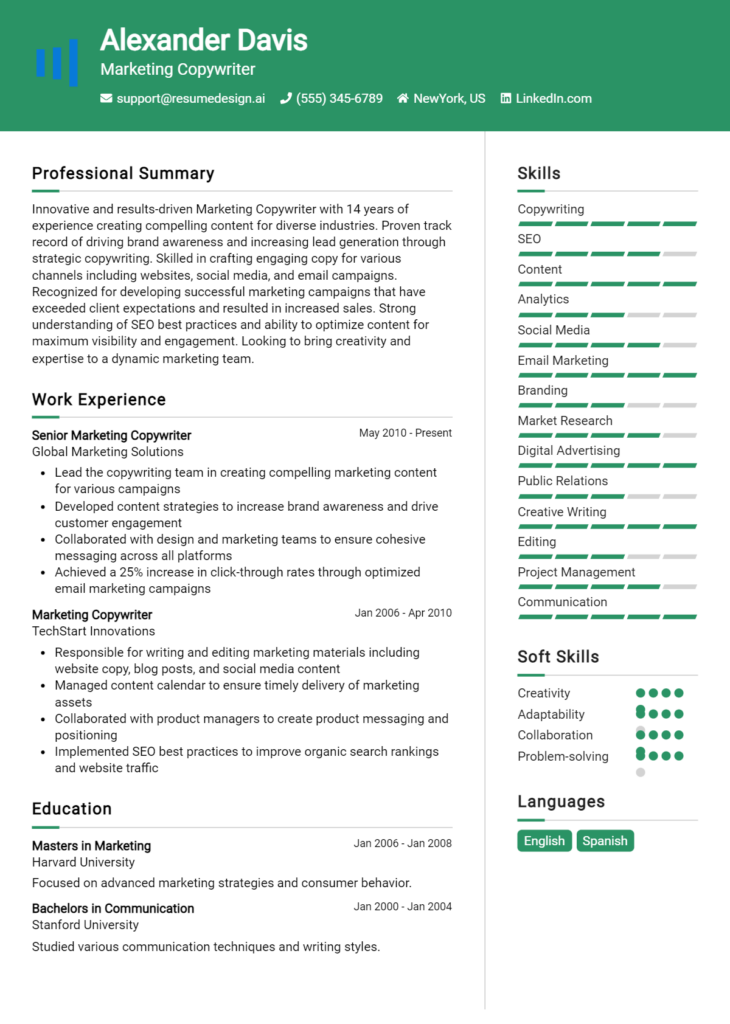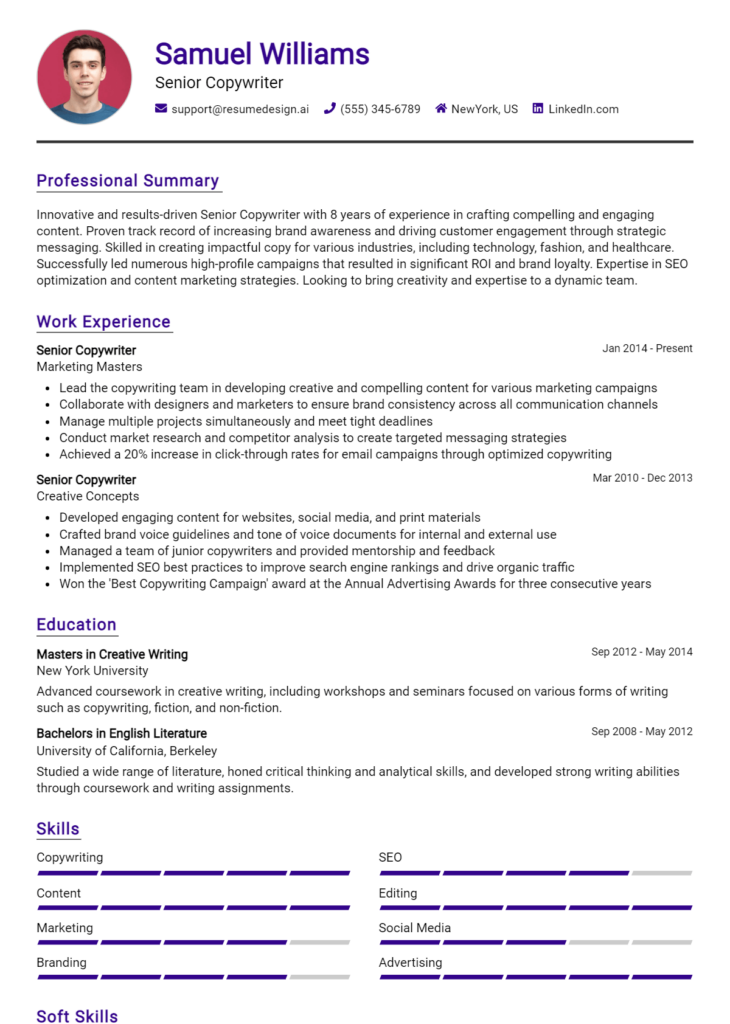Content Writer Core Responsibilities
A Content Writer plays a vital role in crafting clear, engaging, and informative content that aligns with an organization's goals. They collaborate across departments, bridging marketing, SEO, and product teams to ensure consistent messaging. Essential skills include strong writing, research, technical proficiency, and problem-solving abilities, which are crucial for meeting deadlines and addressing diverse audience needs. A well-structured resume can effectively highlight these qualifications, showcasing the candidate's ability to contribute meaningfully to the company's success.
Common Responsibilities Listed on Content Writer Resume
- Researching industry-related topics to create informative content.
- Writing and editing blog posts, articles, and web copy.
- Collaborating with marketing and design teams to produce cohesive content.
- Optimizing content for SEO to enhance online visibility.
- Proofreading and revising content for clarity and accuracy.
- Managing multiple projects and deadlines effectively.
- Utilizing analytics tools to measure content performance.
- Creating engaging social media posts to promote content.
- Developing content strategies that align with business goals.
- Staying updated on industry trends and best practices.
- Conducting interviews and surveys to gather insights.
High-Level Resume Tips for Content Writer Professionals
In today's competitive job market, a well-crafted resume is crucial for Content Writer professionals seeking to make an impact on potential employers. As the first impression a candidate makes, a resume must effectively showcase not only relevant skills but also notable achievements that set the individual apart. A strong resume can open doors to interviews and job offers, making it essential for writers to present themselves in the best possible light. This guide will provide practical and actionable resume tips specifically tailored for Content Writer professionals, ensuring that your resume stands out and resonates with hiring managers.
Top Resume Tips for Content Writer Professionals
- Tailor your resume to match the job description, using keywords and phrases that reflect the requirements of the position.
- Highlight relevant writing experience, including freelance projects, internships, or previous positions that showcase your ability to create compelling content.
- Quantify your achievements wherever possible, such as mentioning the number of articles written, audience engagement metrics, or successful campaigns you've contributed to.
- Include a diverse portfolio link that demonstrates your writing versatility across different formats, including blogs, articles, social media posts, and more.
- Emphasize industry-specific skills, such as SEO knowledge, proficiency in content management systems, and familiarity with analytics tools.
- Use clear and concise language, ensuring your resume is easy to read and free from jargon that may confuse hiring managers.
- Incorporate a strong summary statement at the top of your resume that captures your passion for writing and your unique value proposition.
- Keep your resume design clean and professional, utilizing bullet points and headings for better readability.
- Proofread your resume multiple times to eliminate any spelling or grammatical errors, as attention to detail is crucial in writing professions.
By implementing these tips, you can significantly increase your chances of landing a job in the Content Writer field. A polished and tailored resume not only showcases your skills and accomplishments but also reflects your commitment to professionalism—qualities that potential employers value highly. Stand out from the competition and take the first step toward your dream job with a resume that truly represents your writing prowess.
Why Resume Headlines & Titles are Important for Content Writer
In the competitive field of content writing, a well-crafted resume headline or title serves as a critical first impression for job applicants. A strong headline can immediately grab the attention of hiring managers, succinctly summarizing a candidate's key qualifications in one impactful phrase. It sets the tone for the entire resume, providing a quick insight into what the applicant brings to the table. Therefore, it is essential for content writers to ensure their headlines are concise, relevant, and directly related to the position they are applying for, making it easier for employers to recognize their potential value at a glance.
Best Practices for Crafting Resume Headlines for Content Writer
- Keep it concise: Aim for one impactful phrase that encapsulates your expertise.
- Be specific: Tailor the headline to the specific content writing role you are applying for.
- Highlight key strengths: Use powerful adjectives that reflect your skills and experience.
- Incorporate relevant keywords: Use industry-specific terms that align with the job description.
- Avoid jargon: Make sure your headline is clear and understandable to a broad audience.
- Showcase accomplishments: If applicable, include metrics or achievements that demonstrate your effectiveness.
- Use a confident tone: Convey a sense of professionalism and assertiveness in your wording.
- Align with your personal brand: Ensure that the headline reflects your unique voice and style as a writer.
Example Resume Headlines for Content Writer
Strong Resume Headlines
"Dynamic Content Writer Specializing in SEO-Driven Copy and Engaging Storytelling"
“Award-Winning Freelance Writer with 5+ Years of Experience in Digital Marketing”
“Creative Content Strategist with a Proven Track Record in Boosting Audience Engagement”
Weak Resume Headlines
“Content Writer”
“Looking for a Writing Job”
Strong resume headlines are effective because they are specific and highlight the unique skills and accomplishments of the candidate, making them stand out in a pool of applicants. They immediately convey the applicant's value and expertise, capturing the hiring manager's interest. In contrast, weak headlines tend to be vague or generic, failing to provide any meaningful information or context about the candidate's qualifications. This lack of specificity can lead to missed opportunities, as hiring managers may overlook resumes that don't make a strong initial impact.
Writing an Exceptional Content Writer Resume Summary
A well-crafted resume summary is essential for a Content Writer as it serves as the first impression a hiring manager will have of a candidate. This brief yet powerful paragraph condenses key skills, relevant experience, and notable accomplishments into a compelling snapshot that captures attention quickly. In a competitive job market, where hiring managers sift through numerous applications, a strong summary can differentiate a candidate by showcasing their unique value and aligning their qualifications with the specific needs of the employer. Therefore, it is crucial that the summary is concise, impactful, and tailored to the job the candidate is applying for.
Best Practices for Writing a Content Writer Resume Summary
- Quantify achievements: Use numbers and metrics to illustrate your impact, such as increases in website traffic or engagement rates.
- Focus on relevant skills: Highlight specific skills that are directly applicable to the job, such as SEO optimization, copywriting, or content strategy.
- Tailor for the job description: Customize your summary to align with the requirements and preferences outlined in the job posting.
- Maintain brevity: Aim for 2-4 sentences that deliver maximum information without excessive detail.
- Use active language: Employ strong action verbs and confident language to convey your accomplishments and skills.
- Reflect your personality: Infuse your summary with a touch of your personal style to convey authenticity and make a memorable impression.
- Avoid clichés: Steer clear of overused phrases that can dilute the impact of your summary, such as "hardworking" or "team player."
- Showcase adaptability: Emphasize your ability to adapt to different writing styles and audiences, which is crucial in content writing.
Example Content Writer Resume Summaries
Strong Resume Summaries
Creative and results-driven Content Writer with over 5 years of experience in developing engaging blog posts and articles that boost organic traffic by 120%. Proficient in SEO techniques and social media marketing, with a proven track record of enhancing audience engagement through targeted content strategies.
Detail-oriented Content Writer skilled in crafting compelling copy for digital platforms. Successfully increased newsletter open rates by 40% through strategic content planning and A/B testing. Adept at collaborating with cross-functional teams to produce high-quality materials that align with brand voice and marketing goals.
Versatile Content Writer with a passion for storytelling and a knack for making complex topics accessible. Achieved a 30% increase in user retention by creating informative guides and how-to articles. Experienced in working with both B2B and B2C clients to deliver impactful content that drives conversions.
Weak Resume Summaries
I am a Content Writer with some experience in writing articles and blog posts. I enjoy creating content and hope to work in a great company.
Content Writer seeking a job. I have written for various industries and am willing to learn new things.
The strong resume summaries demonstrate clear, quantifiable results and specific skills that are directly relevant to the role of a Content Writer. They provide concrete examples of achievements and indicate the candidate's impact on their previous employers. In contrast, the weak summaries lack detail and specificity, making them generic and unremarkable. They do not convey any measurable outcomes or unique skills, which diminishes their effectiveness in capturing the attention of hiring managers.
Work Experience Section for Content Writer Resume
The work experience section of a Content Writer resume is a vital component that illustrates the candidate's journey in the field of content creation. This section not only highlights technical skills—such as SEO optimization, content management systems, and research capabilities—but also showcases the writer's ability to manage teams and coordinate projects effectively. By demonstrating a history of delivering high-quality products, candidates can differentiate themselves in a competitive market. Furthermore, quantifying achievements and aligning experiences with industry standards is crucial; it provides tangible evidence of a candidate's contributions and capabilities, making a compelling case to potential employers.
Best Practices for Content Writer Work Experience
- Highlight relevant technical skills, such as SEO, analytics tools, and content management systems.
- Quantify achievements with specific metrics, such as increased traffic, engagement rates, or conversion rates.
- Showcase collaboration by detailing experiences working with designers, marketers, and other stakeholders.
- Use action verbs to convey a sense of initiative and leadership in projects.
- Tailor your experience to align with the specific requirements of the job description.
- Include diverse content formats you've worked on, such as blogs, whitepapers, and social media posts.
- Emphasize continuous learning, including relevant certifications or training in writing and content strategy.
- Provide context for each experience, explaining how your role contributed to team goals or company objectives.
Example Work Experiences for Content Writer
Strong Experiences
- Led a team of 5 writers to produce a content strategy that increased organic website traffic by 150% over 12 months.
- Developed and executed a social media campaign that achieved a 40% increase in engagement and a 25% boost in lead generation within 3 months.
- Implemented SEO best practices that improved search engine rankings for key target keywords, resulting in a 60% increase in page views.
- Collaborated with marketing and design teams to launch a bi-weekly newsletter that grew subscriber base by 200% in one year.
Weak Experiences
- Wrote articles for a website.
- Worked with a team to create content.
- Contributed to various marketing projects.
- Assisted in editing documents.
The examples listed above are considered strong because they provide specific, quantifiable outcomes and demonstrate a clear impact on business goals. They highlight technical leadership and effective collaboration, showcasing the candidate's ability to drive results in a team environment. In contrast, the weak experiences lack detail and fail to convey the candidate's contributions meaningfully. They are vague and do not provide any metrics or context, making it challenging for potential employers to assess the candidate's true capabilities.
Education and Certifications Section for Content Writer Resume
The education and certifications section of a Content Writer resume is crucial as it provides a clear overview of the candidate's academic background and their commitment to professional development. This section not only highlights degrees and relevant coursework but also showcases industry-specific certifications and specialized training that can significantly enhance the candidate's credibility. By demonstrating a dedication to continuous learning, candidates can better align themselves with the expectations of potential employers, showcasing a robust foundation in writing skills, research methodologies, and industry standards.
Best Practices for Content Writer Education and Certifications
- Include only relevant degrees, such as English, Journalism, Communications, or Marketing.
- List certifications that are recognized in the industry, such as SEO, content marketing, or technical writing.
- Provide details about relevant coursework that demonstrates specialized knowledge applicable to content writing.
- Highlight any advanced degrees or specialized training that sets you apart from other candidates.
- Keep formatting consistent and clear for easy readability.
- Use bullet points for clarity and to draw attention to key achievements.
- Consider including online courses or workshops that showcase your commitment to staying updated with industry trends.
- Prioritize the most recent and relevant qualifications to keep the section concise and impactful.
Example Education and Certifications for Content Writer
Strong Examples
- Bachelor of Arts in English Literature, University of XYZ, Graduated May 2020
- Certification in Content Marketing, HubSpot Academy, Completed January 2023
- Advanced Certificate in SEO Writing, Digital Marketing Institute, Completed July 2022
- Coursework in Creative Writing and Technical Communication, University of XYZ
Weak Examples
- Associate Degree in General Studies, Community College, Graduated June 2018
- Certification in Microsoft Office Suite, Completed December 2019
- High School Diploma, High School of ABC, Graduated June 2016
- Outdated Certification in Basic HTML, Completed January 2015
The examples provided are considered strong because they directly relate to the skills and knowledge necessary for a Content Writer role, showcasing both relevant education and industry-recognized certifications. In contrast, the weak examples lack specificity and relevance to the field of content writing, highlighting the importance of aligning educational qualifications with career goals to enhance employability.
Top Skills & Keywords for Content Writer Resume
Crafting a compelling resume as a Content Writer requires a meticulous focus on the skills that define your capabilities and expertise in the field. A well-structured resume not only highlights your experience but also showcases your proficiency in writing, research, and communication. The inclusion of relevant skills is crucial, as it enables potential employers to quickly assess your qualifications and fit for the role. A strategic blend of both hard and soft skills can significantly enhance your resume, making it stand out in a competitive job market. For more insight into how to effectively present your skills, visit our skills page.
Top Hard & Soft Skills for Content Writer
Hard Skills
- SEO Optimization
- Keyword Research
- Content Management Systems (CMS)
- Social Media Marketing
- HTML/CSS Basics
- Copywriting
- Analytics Tools (e.g., Google Analytics)
- Editing and Proofreading
- Research Skills
- Graphic Design Basics
- Technical Writing
- Content Strategy Development
- Email Marketing
- Familiarity with AP Style
- Data Visualization
- Blogging Platforms (e.g., WordPress)
- Multimedia Content Creation
Soft Skills
- Strong Communication
- Creativity
- Attention to Detail
- Time Management
- Adaptability
- Critical Thinking
- Collaboration
- Problem Solving
- Empathy
- Open-mindedness
- Self-motivation
- Organization
- Initiative
- Flexibility
- Interpersonal Skills
- Resilience
- Ability to Accept Feedback
In addition to showcasing your skills, your resume should also effectively outline your work experience, demonstrating how these abilities have been applied in practical settings. By emphasizing both your hard and soft skills, you can create a comprehensive profile that appeals to hiring managers.
Stand Out with a Winning Content Writer Cover Letter
I am excited to apply for the Content Writer position at [Company Name], as advertised on [where you found the job listing]. With a solid foundation in creating engaging and SEO-optimized content, I am confident in my ability to contribute effectively to your team. My passion for storytelling and my commitment to delivering high-quality content align perfectly with [Company Name]'s mission to provide valuable information to its audience.
Throughout my career, I have honed my writing skills across various industries, including technology, health, and lifestyle. My experience includes crafting blog posts, articles, and web copy that not only captivate readers but also drive traffic and engagement. At [Previous Company Name], I successfully increased organic traffic by 40% within six months through targeted content strategies and a keen understanding of audience needs. I thrive in fast-paced environments and adapt quickly to new topics, ensuring that my writing resonates with diverse audiences.
Collaboration is essential in any creative role, and I have worked closely with marketing and design teams to develop cohesive campaigns that reflect brand messaging. I am adept at researching and synthesizing complex information, allowing me to create informative and persuasive content that establishes authority and fosters trust. My proficiency with various content management systems and analytics tools further equips me to contribute to [Company Name]’s content strategy and optimization efforts.
I am eager to bring my unique blend of creativity, technical skills, and a results-driven mindset to [Company Name]. I look forward to the opportunity to discuss how I can help elevate your content initiatives and engage your audience effectively. Thank you for considering my application; I am excited to potentially join your team and contribute to your continued success.
Common Mistakes to Avoid in a Content Writer Resume
When crafting a resume as a content writer, it’s crucial to present your skills and experiences effectively to stand out in a competitive job market. However, many applicants make common mistakes that can undermine their chances of landing an interview. Avoiding these pitfalls will help you create a more polished and professional resume that highlights your expertise and capabilities in content writing.
Neglecting to Tailor the Resume: Failing to customize your resume for each job application can lead to a generic impression. Highlight relevant skills and experiences that align with the specific position you're applying for.
Overloading with Jargon: While industry-specific terminology can demonstrate expertise, using too much jargon can alienate hiring managers who may not be familiar with it. Aim for clarity and accessibility in your language.
Lack of Quantifiable Achievements: Simply listing job responsibilities without showcasing measurable successes can weaken your resume. Include statistics or examples that illustrate the impact of your work, such as increased web traffic or improved engagement rates.
Ignoring Formatting Consistency: A cluttered or inconsistent format can detract from the professionalism of your resume. Ensure that fonts, bullet points, and headings are consistent throughout, making it easy to read.
Using Passive Language: Passive voice can make your writing sound weak or ambiguous. Use active language to convey confidence and assertiveness in your skills and accomplishments.
Failing to Include a Portfolio Link: As a content writer, a portfolio showcasing your best work is essential. Omitting a link to your portfolio can leave hiring managers without a clear sense of your writing ability.
Exaggerating Skills or Experience: While it’s important to showcase your strengths, overstating your skills or experience can backfire during an interview. Be honest about your capabilities and focus on what you genuinely excel at.
Neglecting Proofreading: Spelling and grammatical errors can severely undermine your credibility as a content writer. Always proofread your resume multiple times to ensure it is error-free and polished before submission.
Conclusion
As we wrap up this article on the essential skills and strategies for aspiring content writers, it’s crucial to remember the importance of a well-crafted resume. A standout resume not only showcases your writing skills but also highlights your ability to engage and inform your audience.
Key points discussed include the significance of tailoring your resume to specific job descriptions, emphasizing relevant experience, and demonstrating versatility in different writing styles. We also explored how to effectively present your portfolio, making it easy for potential employers to see your best work.
Now, it’s time to take action! Review your Content Writer Resume to ensure it reflects your skills and experiences accurately. Consider using available resources to enhance your application materials. You can check out resume templates for a professional layout, utilize the resume builder to streamline the process, explore resume examples for inspiration, and don’t forget to create an impactful cover letter using our cover letter templates.
Take the next step in your career journey by refining your resume today!

